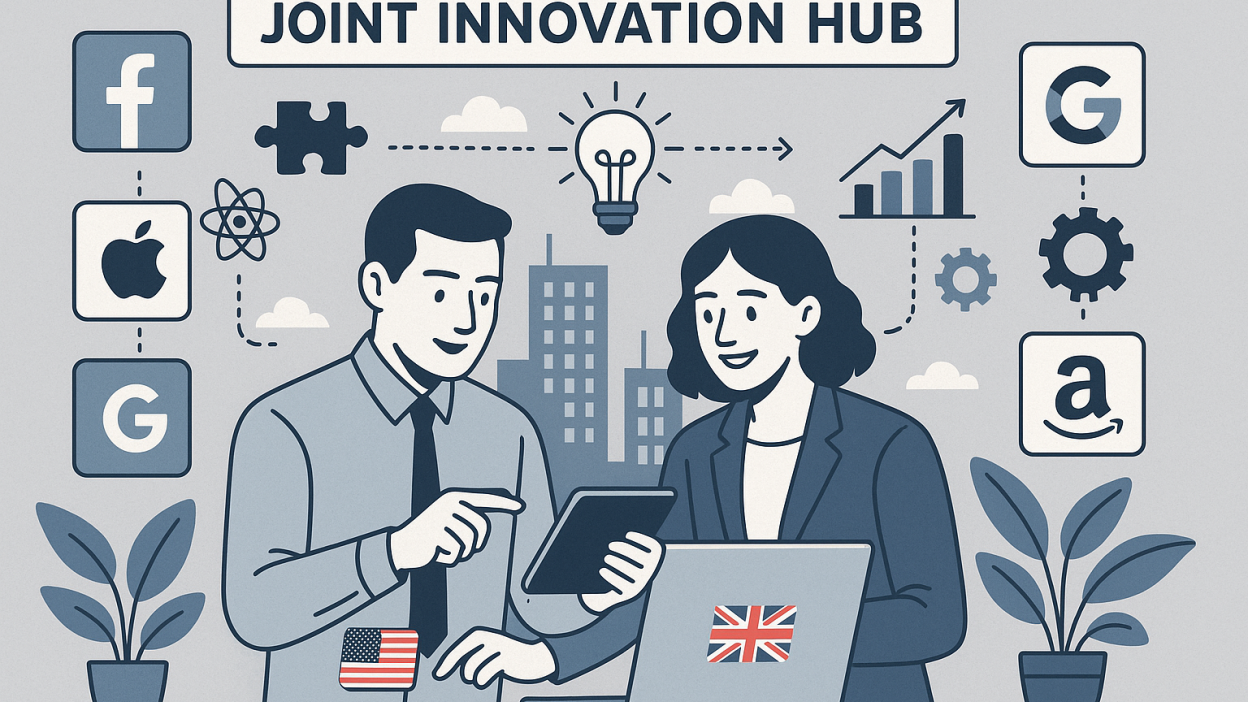Can the U.S.-Tech Partnership Revive the U.K. Economy?
The U.K. economy has faced a turbulent decade. From Brexit-induced uncertainty to the lingering effects of the COVID-19 pandemic, growth has often lagged behind peers in the G7. Inflation pressures, talent shortages, and disrupted supply chains have compounded the challenge, leaving policymakers and businesses searching for new engines of growth. Amid this landscape, one of the most promising prospects lies in the U.S.-tech partnership—a collaboration that blends American innovation, investment capital, and entrepreneurial expertise with the U.K.’s strong financial sector, talent pool, and regulatory frameworks.
Tech-driven growth has historically been a catalyst for national economic revival. In the U.S., tech hubs such as Silicon Valley and Boston have generated thousands of high-paying jobs, boosted exports, and created ecosystems where innovation feeds economic resilience. The question now is whether a transatlantic partnership can replicate such effects in the U.K., catalyzing not only corporate growth but broader societal benefits.
Beyond numbers and GDP forecasts, this partnership carries human and societal implications. For workers, it represents the potential for high-quality employment in emerging sectors such as artificial intelligence, cybersecurity, and green technologies. For entrepreneurs, it offers access to global markets and capital. For the general public, it signals a renewed confidence in the U.K.’s ability to compete on the global stage. This article explores the potential of the U.S.-tech alliance, examining its real-world impact, strategic opportunities, and the hurdles it must overcome to help revive the U.K. economy.
The Current State of the U.K. Economy and Tech Sector
The U.K.’s economic performance has been marked by slower GDP growth compared to the U.S. and other European nations. According to the Office for National Statistics, productivity growth has stagnated, and investment in digital infrastructure lags behind global competitors. Meanwhile, the tech sector, despite being one of the fastest-growing industries in the country, faces challenges such as talent shortages and limited venture capital relative to the U.S.
In 2024, U.K. tech firms attracted $14 billion in venture funding—a record but still a fraction of U.S. investment flows. Startups struggle to scale domestically, often eyeing relocation or partnerships with American investors to access larger markets. These dynamics underscore the potential importance of the U.S.-tech partnership. By channeling capital, mentorship, and market access, the alliance can accelerate the growth of U.K.-based tech companies, fostering job creation and innovation.
A humanized perspective is crucial: thousands of skilled workers—engineers, developers, and data scientists—depend on the vibrancy of the tech sector for livelihood and professional growth. High-quality tech jobs not only elevate income levels but also nurture local communities and drive regional development, from London’s financial corridor to emerging hubs in Manchester, Edinburgh, and Bristol.
U.S.-Tech Investment: Opportunities for Growth
American tech investment in the U.K. has surged in recent years. Major players such as Google, Microsoft, and Amazon are expanding research centers, AI labs, and cloud infrastructure. Venture capital from U.S. funds is increasingly targeting U.K. startups, particularly in sectors like artificial intelligence, fintech, healthtech, and clean energy technologies.
Key opportunities include:
-
Job Creation: U.S.-backed tech initiatives can generate thousands of high-skilled jobs, boosting household incomes and local economies.
-
Knowledge Transfer: Collaboration with American tech giants brings best practices, advanced research methodologies, and management expertise.
-
Export Growth: U.K. tech companies with U.S. partnerships gain access to global markets, enhancing exports and trade balance.
-
Innovation Ecosystems: Joint initiatives encourage cluster development, linking universities, research institutions, and startups to global networks.
A case study is illustrative: London’s AI sector received $3 billion in U.S. venture funding in 2023 alone, enabling startups to scale rapidly, hire top talent, and license technologies internationally. This demonstrates not just economic growth but a societal ripple effect—higher employment, skill development, and regional economic resilience.
Challenges and Risks in the U.S.-U.K. Tech Partnership
Despite clear benefits, several challenges could limit the impact of U.S.-tech collaboration:
-
Talent Shortages: While the U.K. produces world-class graduates, the supply of experienced AI engineers and cybersecurity specialists remains constrained. U.S. partnerships can help bridge this gap, but only if immigration, training, and retention policies align.
-
Regulatory Alignment: Differences in data privacy, taxation, and intellectual property laws may slow joint ventures and technology transfer.
-
Geopolitical Uncertainty: Tensions with China and Europe could affect supply chains and investment flows, creating volatility for U.K. tech startups.
-
Cultural Integration: Startups often face challenges adopting American management styles and operational practices, potentially creating friction in collaboration.
Addressing these risks requires coordinated public-private strategies: workforce development programs, clear regulatory frameworks, and incentives for startups to remain and scale in the U.K., while embracing American investment and mentorship.
Successful U.S.-U.K. Tech Collaborations
Several examples highlight how American tech engagement has revitalized specific sectors:
-
Fintech: U.S. venture capital funding helped Revolut and Monzo expand internationally, creating thousands of high-skill jobs and enhancing financial innovation.
-
AI & Machine Learning: Google DeepMind’s London office collaborated with U.K. universities to develop healthtech solutions, showcasing the societal impact of tech-led innovation.
-
Green Tech: U.S. investment in renewable energy startups accelerated R&D in battery storage and smart grid technologies, helping the U.K. meet climate targets while creating employment.
These examples demonstrate how strategic collaboration does more than boost GDP—it improves citizens’ quality of life, creates knowledge ecosystems, and fosters international competitiveness.
Workforce and Society
Economic revival is ultimately about people. U.S.-tech partnerships provide U.K. workers with:
-
Higher Wages and Benefits: Tech roles often come with competitive salaries, stock options, and learning opportunities.
-
Career Mobility: Exposure to global projects and cross-border teams enhances skills and career trajectories.
-
Community Development: Tech clusters often rejuvenate local economies, supporting education, housing, and public services.
For society at large, successful tech partnerships can counter regional inequality, providing opportunities beyond London and the South East, and stimulating growth in neglected regions.
Strategic Recommendations
To maximize the impact of U.S.-tech collaboration, researchers and policymakers recommend:
-
Invest in Skills: Expand STEM education, reskilling programs, and professional development to address talent gaps.
-
Enhance Regulatory Clarity: Streamline data, IP, and investment regulations to foster cross-border collaboration.
-
Promote Inclusive Growth: Ensure tech-led expansion benefits diverse regions and communities.
-
Encourage Long-Term Partnerships: Move beyond short-term investment to sustained R&D collaboration.
-
Leverage Universities and Research Hubs: Connect academic innovation with American tech resources to accelerate commercialization.
By following these recommendations, the U.K. can ensure that the U.S.-tech partnership delivers tangible economic revival rather than transient gains.
The U.S.-tech partnership offers a promising avenue for revitalizing the U.K. economy. By channeling investment, fostering innovation, and creating high-quality jobs, American engagement can help address long-standing structural challenges—from talent shortages to regional disparities. Beyond GDP metrics, the societal impact is profound: improved livelihoods, skill development, and strengthened global competitiveness.
Yet realizing this potential requires careful strategy. Regulatory clarity, workforce readiness, and inclusive growth policies are essential to ensure that collaboration benefits society broadly, rather than concentrating gains in limited sectors or regions. Successful case studies in fintech, AI, and green tech demonstrate that when structured effectively, transatlantic tech partnerships can become engines of innovation, growth, and societal advancement.
Ultimately, the question is not just whether U.S. tech can revive the U.K. economy, but whether policymakers, businesses, and communities can leverage this opportunity to create a sustainable, human-centered growth model that strengthens the nation’s economic and social resilience for decades to come.
FAQs
Q1. How can U.S. tech investment help the U.K. economy?
By creating jobs, fostering innovation, and providing access to global markets.
Q2. Which sectors benefit most from U.S.-U.K. tech collaboration?
AI, fintech, green technologies, cybersecurity, and digital infrastructure.
Q3. Are there risks to relying on U.S. tech partnerships?
Yes, including talent shortages, regulatory differences, geopolitical tensions, and cultural integration challenges.
Q4. How does tech investment impact society?
It improves employment opportunities, skills, regional development, and overall quality of life.
Q5. What policies support successful collaboration?
STEM education, clear regulations, inclusive growth strategies, and long-term R&D partnerships.
Q6. Can U.K. startups scale without U.S. investment?
While possible, U.S. investment accelerates growth, market access, and innovation capacity.
Stay informed on global tech collaborations and economic strategies. Subscribe to our newsletter for expert insights on U.S.-U.K. partnerships and emerging economic opportunities.
Note: Logos and brand names are the property of their respective owners. This image is for illustrative purposes only and does not imply endorsement by the mentioned companies.



